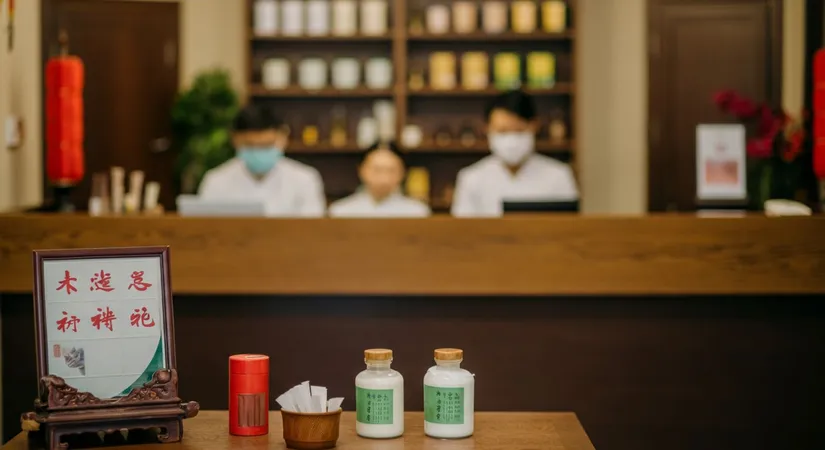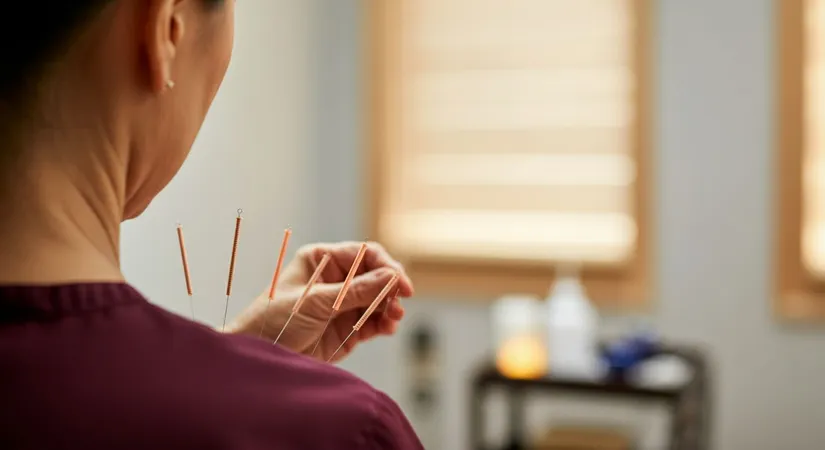Exploring Chinese Medicine Near Me: A Journey into Traditional Healing
Discover local Chinese medicine practices that integrate 2,000 years of healing wisdom for holistic well-being. Explore your options today.
In today's fast-paced world, finding a balance between mind and body is crucial. Chinese medicine offers a holistic approach that integrates thousands of years of knowledge with modern health practices. This article guides you on how to discover and utilize traditional Chinese treatments in your local area to maintain or regain your health.
Understanding Traditional Chinese Medicine: Principles and Practices
Balancing Qi: The Core of Traditional Chinese Medicine
Traditional Chinese Medicine (TCM) revolves around the concept of 'Qi', the vital energy that flows through the body. This energy must be balanced for optimal health. TCM practices, such as acupuncture and herbal remedies, aim to harmonize Qi. For instance, acupuncture involves inserting thin needles into specific points to unblock energy pathways, promoting healing and pain relief. Herbal medicine, another key component, uses natural ingredients to restore balance and support the body's functions.Key Practices in Traditional Chinese Medicine
- Acupuncture: Utilizes needles to stimulate energy flow and alleviate pain.
- Herbal Medicine: Employs plant-based remedies to treat various ailments.
- Dietary Therapy: Focuses on nutrition to maintain health and balance.
Steps to Achieve Balance with TCM
- Consultation: A TCM practitioner assesses your Qi balance through observation and questioning.
- Treatment Plan: A personalized plan is developed, incorporating acupuncture, herbs, and dietary changes.
- Follow-up: Regular sessions to monitor progress and adjust treatments as needed.

Exploring Acupuncture Services for Pain Relief and Stress Reduction
Understanding the Mechanisms of Acupuncture
Acupuncture, a key component of traditional Chinese medicine, involves the insertion of fine needles at specific points on the body. This practice is believed to stimulate the flow of Qi, or vital energy, and is particularly effective for pain relief and stress reduction. Research shows that acupuncture can trigger the release of endorphins, the body's natural painkillers, and improve blood circulation, which aids in healing.Benefits of Acupuncture for Stress and Pain
- Reduces chronic pain by enhancing endorphin production.
- Alleviates stress through the modulation of the nervous system.
- Improves sleep quality, contributing to overall well-being.
Steps to Experience Effective Acupuncture
- Initial Consultation: Discuss health concerns and goals with a certified acupuncturist.
- Treatment Session: Needles are inserted at specific points to target pain and stress.
- Follow-up: Regular sessions to maintain benefits and adjust treatment as needed.

Finding the Best Chinese Medicine Practitioners Near Me
Evaluating Practitioners: Credentials and Reviews
When searching for the best Chinese medicine practitioners near you, it's crucial to evaluate their credentials and reviews. Verified credentials ensure that the practitioner has undergone proper training and adheres to professional standards. For instance, a practitioner certified by a recognized body, such as the National Certification Commission for Acupuncture and Oriental Medicine (NCCAOM) in the United States, demonstrates a commitment to quality care. Reviews from previous patients provide insights into the practitioner's effectiveness and patient satisfaction. Positive reviews often highlight successful treatments and a practitioner's ability to communicate effectively with patients. For example, a practitioner with numerous positive reviews for treating chronic pain with acupuncture may indicate a high level of expertise in that area.Visiting Clinics: Experiencing Ambiance and Services
- Observe the clinic's cleanliness and organization, reflecting professionalism.
- Experience the practitioner's approach to patient care and communication.
- Assess the range of services offered, such as herbal remedies and acupuncture.
Steps to Choose the Right Practitioner
- Research: Gather information on practitioners' credentials and specialties.
- Consultation: Schedule initial visits to discuss your health needs and expectations.
- Decision: Choose a practitioner who aligns with your health goals and comfort level.
Where to Buy Chinese Herbs Locally: A Guide to Herbal Remedies
Exploring Local Sources for Chinese Herbal Medicine
Chinese herbal medicine is a cornerstone of Traditional Chinese Medicine (TCM), offering natural solutions for various health issues. To find these herbs locally, consider visiting health food stores or specialized herbal shops. These establishments often stock a wide range of herbs used in TCM, such as ginseng for energy and astragalus for immune support. Local herbal shops provide an opportunity to explore a diverse selection of remedies, often with knowledgeable staff who can offer guidance on their uses. For example, a shop specializing in TCM might offer personalized herbal blends tailored to individual health needs, enhancing the effectiveness of the treatment.Benefits of Buying Locally
- Access to fresh, high-quality herbs that are often more potent.
- Opportunity to consult with experts who understand TCM principles.
- Support for local businesses, contributing to community well-being.
Steps to Find Chinese Herbs Locally
- Research: Identify local stores that specialize in herbal medicine.
- Visit: Explore the selection and consult with staff about your needs.
- Purchase: Choose herbs that align with your health objectives.
The Role of Chinese Medicine in Holistic Health
Integrating Mind, Body, and Spirit Through Chinese Medicine
Chinese medicine plays a crucial role in holistic health by integrating mental, physical, and spiritual wellness. This approach emphasizes the interconnectedness of the body's systems and the importance of balance. For instance, practices like Tai Chi not only improve physical strength and flexibility but also enhance mental clarity and emotional stability. This ancient martial art is often used to reduce stress and promote a sense of peace, illustrating the holistic nature of Chinese medicine.Key Elements of Holistic Health in Chinese Medicine
- Mindfulness: Practices such as meditation and Tai Chi foster mental clarity and emotional balance.
- Physical Wellness: Techniques like acupuncture and herbal remedies support bodily functions and healing.
- Spiritual Connection: Emphasizes harmony with nature and the universe, enhancing overall well-being.
Steps to Embrace Holistic Health with Chinese Medicine
- Assessment: Evaluate your current health status and identify areas needing balance.
- Integration: Incorporate practices like Tai Chi, meditation, and herbal remedies into daily routines.
- Reflection: Regularly assess progress and adjust practices to maintain harmony and wellness.
Integrating Traditional Chinese Medicine for Holistic Health
Traditional Chinese Medicine (TCM) offers a comprehensive approach to health by balancing Qi, the vital energy, through practices like acupuncture and herbal remedies. These methods are designed to harmonize the body's energy flow, promoting healing and overall well-being.
Practitioners of TCM are often certified by recognized bodies, ensuring they have undergone rigorous training. This certification demonstrates their commitment to providing quality care and their expertise in utilizing ancient techniques alongside modern health practices.
Finding Trusted Chinese Medicine Practitioners Locally
Evaluating practitioners based on their credentials and patient reviews is essential for ensuring quality care. Visiting clinics allows potential patients to experience the ambiance and services firsthand, contributing to informed decision-making.
Positive patient testimonials often highlight successful outcomes and effective communication, reinforcing the practitioner's reputation and reliability in providing holistic health solutions.
Frequently Asked Questions
What is the role of Qi in Traditional Chinese Medicine?
In Traditional Chinese Medicine (TCM), Qi is considered the vital energy that flows through the body. Balancing Qi is essential for maintaining health, and TCM practices like acupuncture and herbal remedies aim to harmonize this energy. By ensuring a balanced Qi, TCM promotes healing and overall well-being.
How can I find reputable Chinese medicine practitioners near me?
To find reputable Chinese medicine practitioners near you, evaluate their credentials and patient reviews. Look for practitioners certified by recognized bodies, such as the National Certification Commission for Acupuncture and Oriental Medicine (NCCAOM). Visiting clinics can also provide insights into their services and professionalism.
What are the benefits of acupuncture services for stress and pain relief?
Acupuncture services offer significant benefits for stress and pain relief by stimulating the body's natural healing processes. This practice enhances endorphin production and improves circulation, effectively reducing chronic pain and alleviating stress. It provides a natural alternative to conventional treatments, promoting holistic health.
Where can I buy Chinese herbal remedies locally?
Chinese herbal remedies can be purchased locally at health food stores or specialized herbal shops. These establishments often stock a wide range of herbs used in Traditional Chinese Medicine, such as ginseng and astragalus. Consulting with knowledgeable staff can help you choose the right herbs for your health needs.
How does Chinese medicine contribute to holistic health?
Chinese medicine contributes to holistic health by integrating mental, physical, and spiritual wellness. Practices like Tai Chi and meditation enhance mental clarity and emotional balance, while acupuncture and herbal remedies support physical health. This comprehensive approach promotes harmony and well-being across all aspects of life.
Discover the Path to Healthy Beauty with estethica's Expert Care!
📞 Call Now for Your Free Consultation!
Fill in the Form
We call you immediately